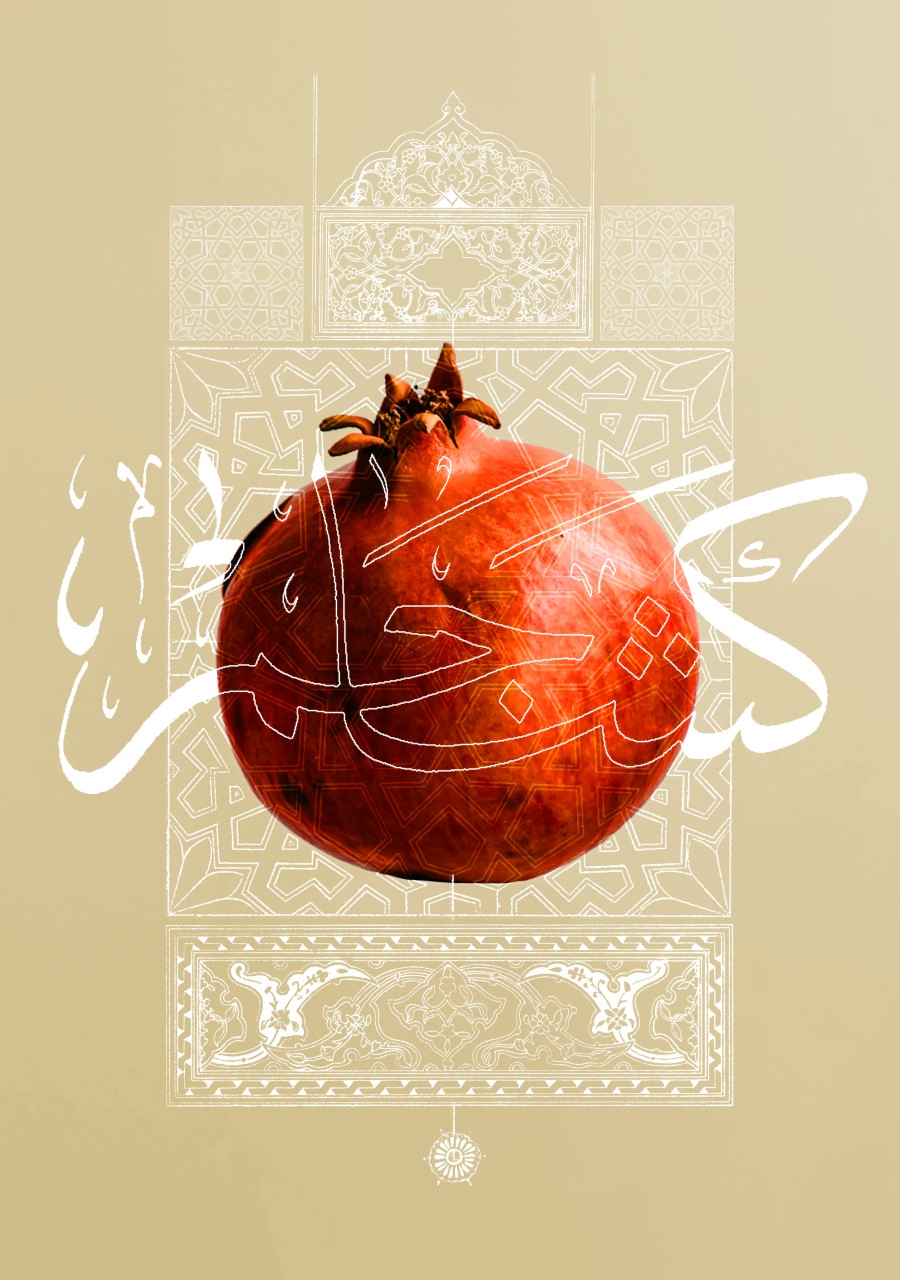On Asparagus:
We have spears with crooked ends
that stand tall and proud
With most agreeable sleek shafts
and heads that crown their stalks,
In form like soldiers, bold and stout,
in posture straight like sturdy staffs,
Clothed in raiment of green sarcenet
inwrought with a flaming blush,
Like a tinted cheek flushed
by an irritated hand
Or a hand turned red
in a silver bowl filled with ice,
Elegantly arranged on platters
like neat embroidered goldwork
Adorning the hemline of the finest silk –
o if only we had a bottomless well!
They are dressed with an oily relish
that ebbs and tides like seafoam
When drizzled onto the stalks
like nets of cast silver and gold
And pearl rings with gemstones adorned,
adding beauty to their beauteous form.
A sedulous ascetic would break his fast
and yield before such a repast.
On Mushabbak:
A most agreeable food
that brings about joyful glee
Is plaid and knit sweetmeat
oozing with honey
Laid out on silver platters,
yielding before me
Like joined cross-bars of gold
scented with amber and camphor tree.
On Khushkanānaj:
Lo, as powdered sugar,
pounded soft almonds,
And semolina are kneaded together
with musk-sweet rose water,
Crimped, rolled, and stuffed
with every scrumptious foodstuff,
And shaped like a string of crescents
rising in timely succession before sunrise.
Never in my life have I seen Khushkanānaj
that fell short of gratifying the senses.
Whose heart does not long for it?
Whose hands are not enticed by it?
It would be discourteous if you ever were
to deny me my share,
For my mouth cannot help but water
whenever I hear its name.
On Pomegranates:
The pomegranates’ beauteous forms appeared,
some whole, some cleft pouring forth
With seeds in yellow and saffron-red hues
in beauty that surpasses all attributes,
Like glistening rubies safely casketed
in an ivoried jewelry box.
عن الهليون:
لَنَا رِمَاحٌ فِي أَعَالِيْهَا أَوَدْ مُفَتَّلَاتُ الْجِسْمِ فَتْلًا كَالْمَسَدْ
مُسْتَحْسَنَاتٌ لَيْسَ فِيْهَا مِنْ عُقَدْ لَهَا رُؤُوسٌ طَالِعَاتٌ فِي جَسَدْ
مَكْسُوَّةٌ مِنْ صَنْعَةِ الْفَرْدِ الصَّمَدْ مُنْتَصِبَاتٌ كَالْقِدَاحِ فِي الْعُمُدْ
ثَوْبٌ مِنَ السُّنْدُسِ مِنْ فَوْقِ جَسَدْ قَدْ أُشْرِبَتْ حُمْرَةَ لَوْنٍ يَتَّقِدْ
كَأَنَّهَا مَمْزُوجَةً حُمْرَةُ خَدْ قَدْ فَرَصَتْ حُمْرَتَهُ كَفٌّ حَرَدْ
فَخَالَطَتْهُ حُمْرَةُ خَدٍّ وَيَدْ كَأَنَّهَا فِي صَحْنِ جَامٍ أَوْ بَرَدْ
مُنَضَّدَاتٌ كَتَنَاضِيْدِ الزَّرَدْ نَسَائِجُ الْعَسْجَدِ حُسْنًا مُنْتَضَدْ
كَأَنَّهَا مُطْرَفُ خَزٍّ قَدْ مَهَدْ لَوْ أَنَّهَا تَبْقَى عَلَى طُولِ الْأَبَدْ
كَانَتْ فُصُوصًا لِخَواتِيْمِ الْخُرَدْ مِنْ فَوْقِهَا مَزْىٌ عَلَيْهَا يَطَّرِدْ
يَجُولُ فِي جَانِبِهَا جَزْرٌ وَمَدْ مَكْسُوَّةً مِنْ زَيْتِهَا ثَوْبَ زَبَدْ
كَأَنَّهُ مِنْ فَوْقِهِ حِيْنَ لَبَدْ شِرَاكُ تِبْرٍ أَوْ لُجَيْنٍ قَدْ مَسَدْ
فَلَوْ رَآهَا عَابِدٌ أَوْ مُجْتَهِدْ أَفْطَرَ مِمَّا يَشْتَهِيْهَا وَسَجَدْ
عن المشبك:
أَطْيَبُ مَا نِلْتُ مِنَ الَّلذَّاتِ وَمِنْ سُرُورٍ مُعْجِبِ الْأَوْقَاتِ
مُشَبَّكَاتٌ وَمُفَصَّلَاتٌ فِي عَسَلِ النَّحْلِ مُشَرَّبَاتِ
كَأَنَّ مَا صُفِّفَ فِي الْجَامَاتِ إِذَا تَرَاءَتْ لِيَ مَاثِلاَتِ
قُضْبَانُ تِبْرٍ مُتَرَاكِبَاتِ مُعَنْبَرَاتٍ وَمُكَفَّرَاتِ
عن الخُشْكِنَانِكَ:
مَنْ لِذَاكَ الطَّبَرْزَذِ الْمَسْحُوقِ وَلِذَاكَ اللَّوْزِ الطَّرِي الْمَدْقُوقِ
وَدَقِيْقُ السَّمْيِذِ يُعْجَنُ بِالْمَا وَرْدِ عُلِّى بِمِسْكِهِ الْمَسْحُوقِ
ضُمَّ أَجْزَاؤُهُ وَأُلِّفَ أَجْسَامًا حَوَتْ كُلَّ مَطْعَمٍ مَوْمُوقِ
ثُمَّ صَفُّوهُ كَالأَهِلَّةِ لاَحَتْ لِمَوَاقِيْتِهَا حِيَالَ الشُّرُوقِ
مَا رَأَيْنَا كَخُشْكِنَانِكَكَ الْمَوْصُوفِ رَعْيًا لِحَقِّهِ فِي الْحُقُوقِ
أَيُّ قَلْبٍ إِلَيْهِ غَيْرُ مَشُوقٍ أَيُّ طَرْفٍ إِلَيْهِ غَيْرُ عَلُوقِ
غِبْتَ عَنِّي فَغَابَ عَنِّي نَصِيْبِي أَنْتَ عِنْدِي بِذَاكَ غَيْرُ خَلِيْقِ
لِيْسَ لِي مِنْهُ غَيْرَ أَنِّي إِذَا مَا عَنَّ لِي ذِكْرُهُ أَغَصُّ بِرِيْقِي
عن الرمان:
وَلَاحَ رُمَّانُنَا فَزَيَّنَنَا بَيْنَ صَحِيْحٍ وَبَيْنَ مَفْتُوتِ
مِنْ كُلِّ مُصْفَرَّةٍ مُزَعْفَرَةٍ تَفُوقُ فِي الْحُسْنِ كُلَّ مَنْعُوتِ
كَأَنَّهَا حُقَّةٌ فَإِنْ فُتِحَتْ فَصُرَّةٌ مِنْ فُصُوصِ يَاقُوتِ
Artwork by Hassân Al Mohtasib
